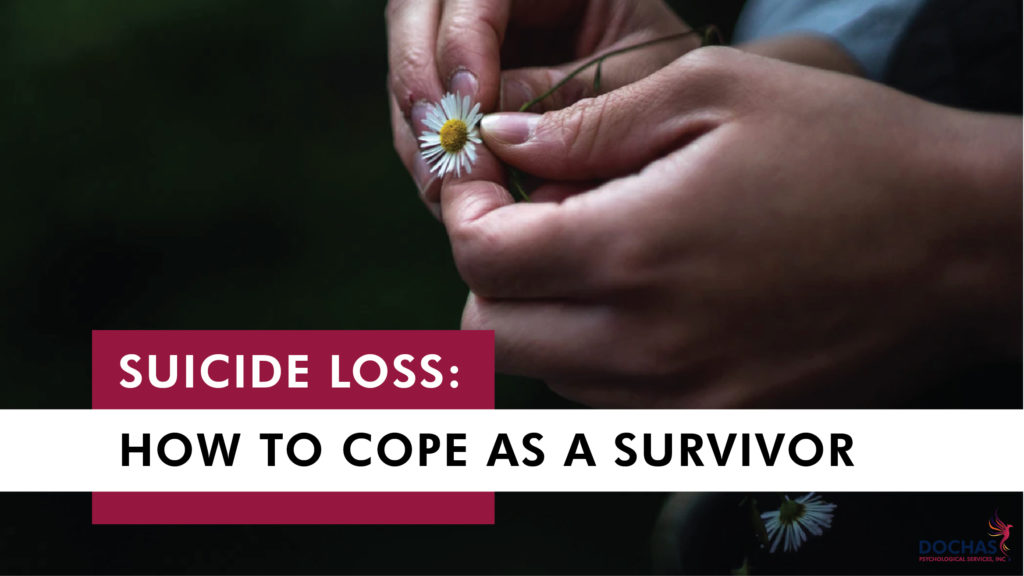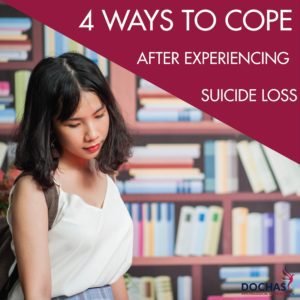With International Survivors of Suicide Loss Day passing just a few weeks ago, we recognize the impact this day may have on a number of people. The Canadian Mental Health Association records over 500 suicide deaths in Alberta every year. The World Health Organization states that every suicide is a tragedy that leaves long-lasting effects on the family and friends who are left behind. With the holidays approaching and a new year in sight, there are likely many families who are suffering from the pain of another year without their loved one. We wrote this blog to openly discuss the trauma that is associated with suicide deaths, and to give suggestions on how to cope with suicide loss.
Emotional Impact on Survivors of Suicide Loss

There are many emotions that one can experience after losing someone to suicide. It is important to remember that there is no right or wrong way to feel, and there are no specific emotions that you “should” or “shouldn’t” experience. The Canadian Association for Suicide Prevention indicates that some people may feel anger toward the person who died or toward someone who they may view to be at fault for the death. Some people may feel relief if their relationship with that person was negative or chaotic.
Other common emotions include sadness, denial, guilt, shame, numbness, hurt, fear, shock, and depression. Sometimes the loss of a loved one to suicide can be so unbearable that thoughts of suicide begin to creep into your mind. These thoughts are common in a situation like this, and it’s important to remember that help is available to you. At the end of this blog you can find a list of resources.
Ways to Cope After Experiencing Suicide Loss
Stay Connected
It’s important that you do not isolate from the people in your life. With the COVID-19 restrictions it can be difficult to get the connection your mind and body need, especially during an emotional time. While keeping in mind COVID-19 safety measures, we suggest connecting with people in your life who are caring and who you feel safe talking to. This could be a family member, a friend, a neighbour, or even a co-worker. It could also be someone from a suicide bereavement support group.
Plan Ahead
If you know a holiday or anniversary is approaching, it is suggested by the Canadian Mental Health Association that you plan some coping activities ahead of time. These could be rituals you start to do each year, taking part in the person’s favourite activity or meal, or having a cherished item present in memory of them. Any of these can provide comfort and support your healing. Your emotions may change as the holiday or anniversary gets closer, so do not hesitate to alter your plans.
Be Patient
It’s important to remember to be patient and gentle with yourself. This means giving yourself time to grieve. The same way you are able to offer compassion and support to someone else in need, you want to give yourself permission to offer that same level of compassion toward yourself.
Don’t Ignore Your Emotions
Allow yourself to sit with difficult and painful emotions in order to properly process them. For example, things like journaling or opening up to someone are ways you can process your emotions. The simple act of acknowledging the suicide can be a good start to the grieving process. The Canadian Mental Health Association notes that it is important to keep in mind that you have no control over how others may respond to your grief. Some people may say the wrong thing unintentionally, not say anything at all, or feel uncomfortable asking you how you are doing.
Others may surprise you with their kindness, compassion, and support. Don’t feel afraid to ask for support in whatever way you feel you need it.
Resources for Survivors of Suicide Loss
It’s important to acknowledge that your loss is traumatic and there are people who you can turn to for help and advice when you feel you need it. If you are seeking a professional to talk to about your loss and grief, click here to connect with a Dochas Psychological Professional.
Click here for a list of book recommendations for loss survivors.
Individuals who have lost someone to suicide are at higher risk of suicide themselves. For assistance, call 1.833.456.4566 or text at 45645. You can also visit Crisis Services Canada for additional information and assistance.
If you’re experiencing suicidal thoughts, call 780-482-HELP (4357).
Disclaimer
Information provided through Dochas Psychological Services blogs or vlogs are meant for educational purposes only. They are NOT medical or mental health advice. You can read more about our disclaimer here.


